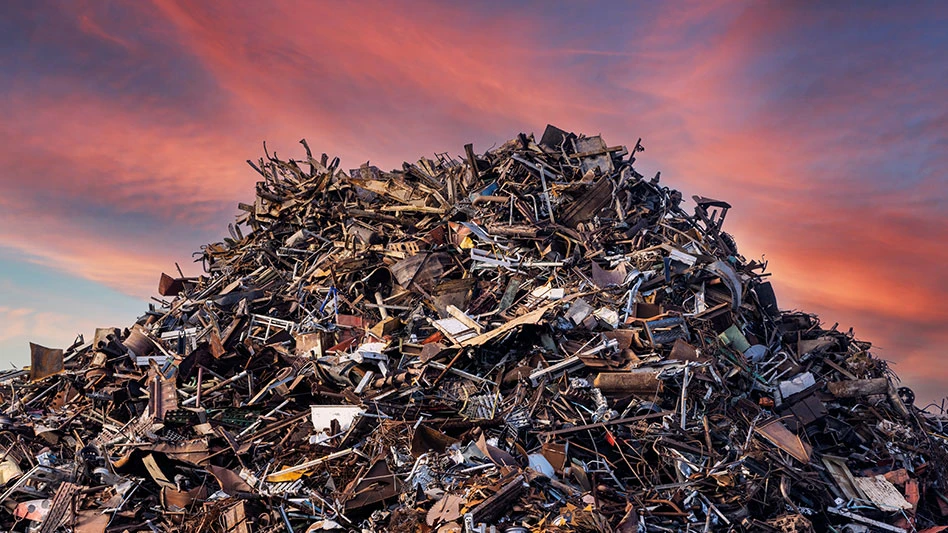Despite widespread reports of problems doing business in Russia, Eastern Europe and the Commonwealth of Independent States, there is evidence of significant economic activity and government reforms in those countries that will eventually result in opportunities for the U.S. scrap processing and recycling industry.
But at the current time, much of the metal generated in those countries is recycled by Western Europe, and U.S. processors and traders are generally wary about getting involved. The most notable exceptions are U.S. firms sending metal to be toll-processed in state-of-the-art refineries that happen to be located in that part of the world, and those with joint ventures in the region.
In Russia, the recent victory of President Boris Yeltsin over his Communist opponent is a promising occurrence, which many observers believe will spur Western investment. There are also reports that physical infrastructure and telecommunications in Russia are steadily improving, and that increasing numbers of Russian businesses are adopting U.S. business practices.
But despite these promising signs, there are still tales of disorganization, lack of transportation and infrastructure, crime, and problems meeting quality specifications in the region. Many U.S. scrap processors and brokers have horror stories about failed trades with Russia and other Eastern European countries, and many are in no hurry to get involved.
"I’m extremely jaded about doing business there," says Michael Friedman, president of Friedman Metals Brokerage Co., York, Pa. "When someone mentions Russia and the CIS, I basically run."
Friedman bought titanium spills from a foundry in Russia. While trying to arrange for his customer to inspect the material – a question of obtaining visas, getting the material shipped to where the buyer could inspect it, and other hurdles – the price went up and the foundry sold it again to someone else.
"There is no contract law there, so a contract doesn’t mean anything, and what laws they have are difficult to enforce," he says.
There are also reports of corruption on the most basic levels. For example, Friedman relates the tale of a U.S. citizen riding a train in Russia from one city to another. The conductor asked to see his passport, and then demanded $100 before he would return it.
TIMING IS EVERYTHING
Right after the fall of Communism, there was a rush of people from all over the world trying to find opportunities in Russia and the CIS, says Mike Sheerr, president of Consolidated Metals, Southampton, Pa.
"There were too many people all going and thinking they could find something which just wasn’t there," he says. "If you camped out there for years, established offices, and they really got to know you, it might be possible. By the time I got there, everything had fizzled out."
Sheerr was able to do some business there in remelted brass, but finally gave up on it. He says it is easier for large companies, which are able to give Russian plants a large sum of money up front, to conduct long-term business arrangements there than for smaller U.S. brokers.
"For the average guy to make a deal, you either had to give them your money and trust them for the metal, or they had to trust you with the metal, and you could give them the money later," says Sheerr. "There was nothing like a simultaneous exchange of the money and the metal. Somebody always had to trust somebody for a certain length of time, and that’s usually when it all bogged down."
But there are some impressive facilities in Russia, says Sheerr. To him, the most notable is a huge scrap steel processing plant in Nizhny Novgorod, the third-largest city in Russia.
"It seemed like every piece of scrap steel, from all the auto plants in this very industrial city, had to go into this one plant," says Sheerr. "The last steel I got involved with was from this particular plant. The guy was going to sell us some bundles, but it got so complicated because somebody else had to take it to the water, maybe a mile or two away, somebody else had to put it on a barge, and another barge company had to take it down the river. We were going to have to deal with maybe 8 or 10 different people. If one link in the chain had broken down, the whole deal would have broken down. And everything was money first, money first. I finally said ‘Thanks but no thanks.’"
Despite these bad experiences, Sheerr thinks it is possible for U.S. companies to do business in Russia, particularly if they have been involved for five years or so, have significant contacts, and can be physically present there for long periods of time. But it takes a lasting commitment.
"You can’t go over there for a week, buy some metal, and come home with it," he says. "It won't work."
QUALITY CONCERNS
There are some series concerns with the quality of scrap material coming from Russia and the CIS. Alex Laschiver, president of Alpha Plastics, Camden, N.J., an immigrant from Russia, attempted to do some trading in metals from the country, but found the quality too inconsistent.
"In Moscow I was involved with a company that recycles aluminum, and I brought some samples back here to be tested," he says. "The percentage of aluminum was supposed to be no less than 94 percent, but unfortunately it was all over the board. Some samples were less than 80 percent. Their recycling program is not that accurate."
There is also a general lack of good recycling equipment in Russia, says Laschiver. "A company might have a lot of copper cables but lack cable stripping equipment. They say ‘well, if you want to be involved, you have to purchase equipment, bring it in, and then you’ll be part of the company.’ But it’s not stable enough there to invest a lot of money."
Laschiver agrees that it would be necessary to be physically present in Russia for long periods of time to be successful in business there. Since he wasn’t prepared to do that, he decided to stop trying.
"For example, I signed a contract, and usually here it would take a couple of days to strike the deal," he says. "When I told the other party I would only be there three weeks, they said ‘wow, it’s not going to be enough – you have to stay here at least for three months.’"
There are some inefficient business practices left over from Russia's Communist years, as well. Laschiver once left the country with some samples of copper foil that was shiny and could easily be mistaken for gold by customs officials. Due to the heavy penalties involved in taking gold out of Russia, he asked the company that gave him the sample for a letter verifying the material was copper foil.
"The guy said, ‘no problem, we can give you this kind of letter, but it will take us three to four days to produce it,’" he says. "Normally, I can dictate my secretary a letter and it’s done in 10 minutes. But in Russia, somebody has to create the letter, and send it upstairs for approval. Then they have to send it to a typist. Then they send back to somebody to check that everything is correct. Finally, it goes to the big boss and he has to sign it and put the seal on it."
Often, trade – especially in equipment – with Russia becomes a kind of barter, says Laschiver.
"Since no-one is willing to pay up front, it is on a consignment basis," he says. "You bring the equipment, and they’ll pay you with the goods that they produce with the equipment."
Sponsored Content
Labor that Works
With 25 years of experience, Leadpoint delivers cost-effective workforce solutions tailored to your needs. We handle the recruiting, hiring, training, and onboarding to deliver stable, productive, and safety-focused teams. Our commitment to safety and quality ensures peace of mind with a reliable workforce that helps you achieve your goals.
Sponsored Content
Labor that Works
With 25 years of experience, Leadpoint delivers cost-effective workforce solutions tailored to your needs. We handle the recruiting, hiring, training, and onboarding to deliver stable, productive, and safety-focused teams. Our commitment to safety and quality ensures peace of mind with a reliable workforce that helps you achieve your goals.
Sponsored Content
Labor that Works
With 25 years of experience, Leadpoint delivers cost-effective workforce solutions tailored to your needs. We handle the recruiting, hiring, training, and onboarding to deliver stable, productive, and safety-focused teams. Our commitment to safety and quality ensures peace of mind with a reliable workforce that helps you achieve your goals.
Sponsored Content
Labor that Works
With 25 years of experience, Leadpoint delivers cost-effective workforce solutions tailored to your needs. We handle the recruiting, hiring, training, and onboarding to deliver stable, productive, and safety-focused teams. Our commitment to safety and quality ensures peace of mind with a reliable workforce that helps you achieve your goals.
Sponsored Content
Labor that Works
With 25 years of experience, Leadpoint delivers cost-effective workforce solutions tailored to your needs. We handle the recruiting, hiring, training, and onboarding to deliver stable, productive, and safety-focused teams. Our commitment to safety and quality ensures peace of mind with a reliable workforce that helps you achieve your goals.
Sponsored Content
Labor that Works
With 25 years of experience, Leadpoint delivers cost-effective workforce solutions tailored to your needs. We handle the recruiting, hiring, training, and onboarding to deliver stable, productive, and safety-focused teams. Our commitment to safety and quality ensures peace of mind with a reliable workforce that helps you achieve your goals.
Sponsored Content
Labor that Works
With 25 years of experience, Leadpoint delivers cost-effective workforce solutions tailored to your needs. We handle the recruiting, hiring, training, and onboarding to deliver stable, productive, and safety-focused teams. Our commitment to safety and quality ensures peace of mind with a reliable workforce that helps you achieve your goals.
REFINING SUCCESS
The few in the U.S. recycling industry that seem satisfied with their dealings in the former Iron Curtain countries are those that deal only with refineries, such as Steven Strulowitz, president of Sovereign Recycling International, Bettendorf, Iowa.
"We send scrap nickel and cobalt to be toll processed in Russia," he says. "Pure nickel and cobalt are returned. I’ve been doing it since 1992 and I’ve been satisfied."
Because there are no plants in the U.S. with the capability of processing this type of material, it is cost-effective for his company to send materials to Russia, says Strulowitz. "There are really very few plants in the world that have that capability of doing that particular process," he says, "so it either goes to Russia or to Norway, and what’s the difference?"
These efforts have had a significant impact, he adds. "Because of our cooperation, nickel processed in Russia was for the first time allowed to be sold to the U.S. mint vis a vis my tolling contract."
Another company that has been successful in dealing with Russia and the CIS is Sabin Metal Corp., East Hampton, N.Y., which has a joint venture with the largest palladium refinery in the world. The company, a state-of-the-art facility, is located in Krasnoyarsk, in Eastern Siberia.
"We have business going in both directions right now," says Richard DeSantis, assistant to the president of Sabin Metal Corp. "They recognize, as we do, that no refinery is everything to everyone, and therefore there are certain things that we can do better than they can, and vice versa. We have a really good working relationship."
Despite the company’ success, DeSantis is well aware of the challenges of conducting business in the region. "Doing business in Eastern Europe is like hitting a moving target," he says. "Things change from day to day, and you really need to be on your toes."
Some estimate that it will be five or 10 years before Russia is stable enough for Western investment. Laschiver thinks it could be significantly longer. "It’s going to take a couple of generations until they get up to the level of Western-style life," he says.
The author is editor of Recycling Today.
Get curated news on YOUR industry.
Enter your email to receive our newsletters.

Explore the August 1996 Issue
Check out more from this issue and find your next story to read.
Latest from Recycling Today
- Altilium produces EV battery cells using recycled materials
- Brightmark enters subsidiaries of Indiana recycling facility into Chapter 11
- Freepoint Eco-Systems receives $50M loan for plastics recycling facility
- PET thermoform recycling the focus of new NAPCOR white paper
- Steel Dynamics cites favorable conditions in Q1
- Hydro starts up construction in Spain
- Green Cubes unveils forklift battery line
- Rebar association points to trade turmoil






